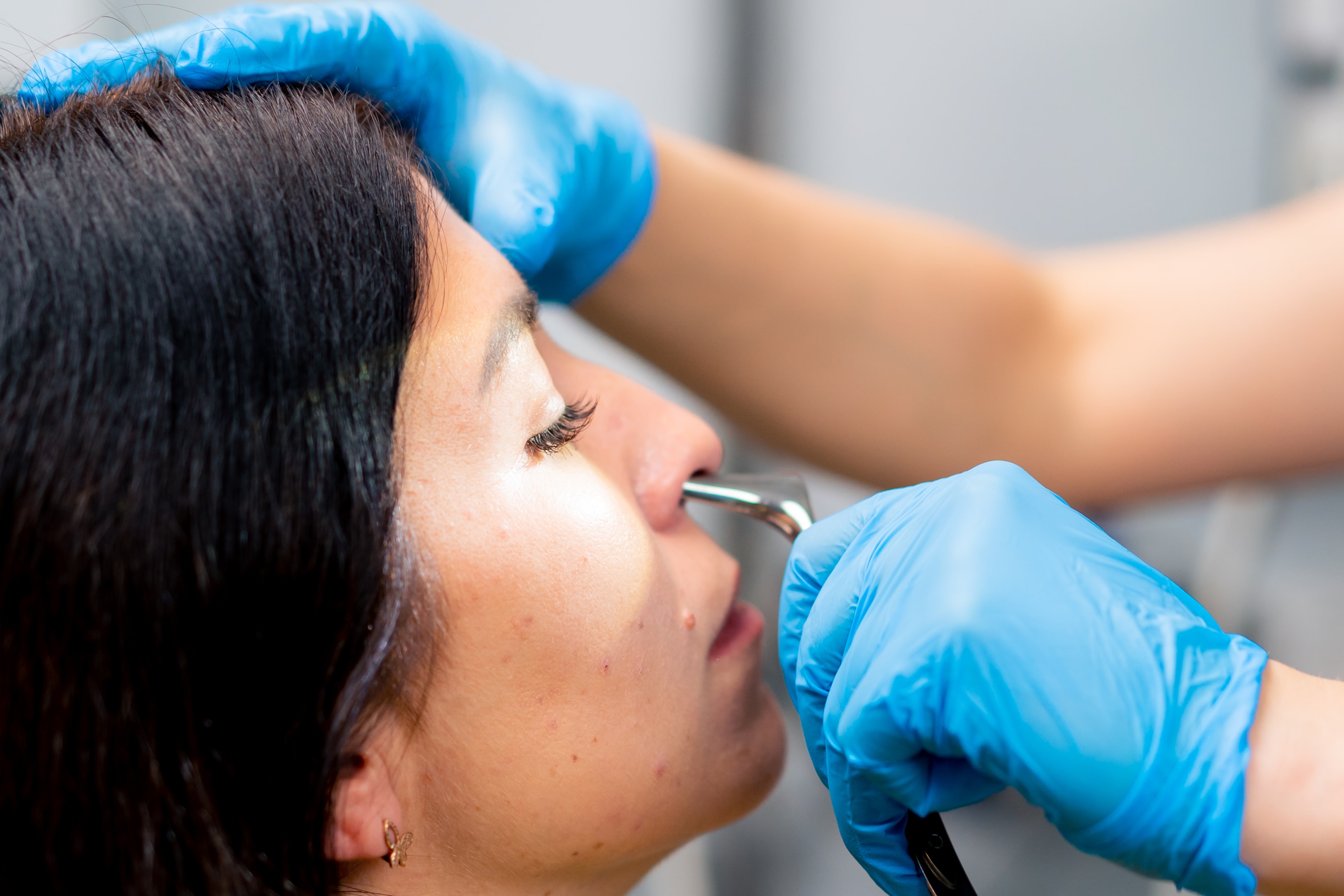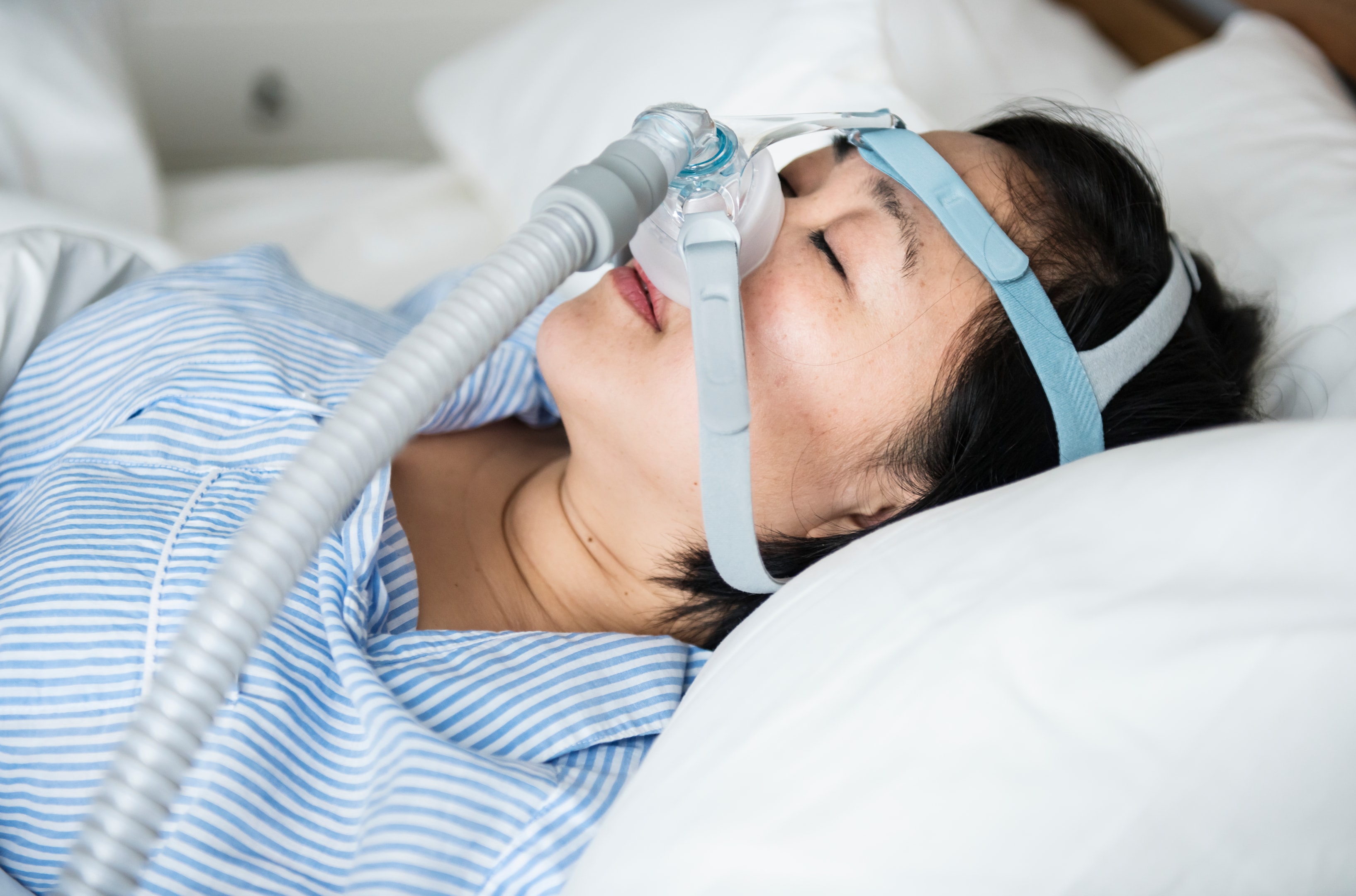


Imagine your nasal passages as a highway system.
When everything is clear and well-aligned, traffic flows smoothly.
But what happens when there’s a major roadblock?
That’s precisely what a deviated nasal septum can do to your nasal airways.
A deviated nasal septum, which can be caused by inherited factors or facial trauma, can wreak havoc on your sleep and overall health.
In this post, we’ll explore the relationship between a deviated septum and sleep apnea, discuss the concerns surrounding these conditions, dive into the necessity of surgery, and understand how serious sleep apnea can be.
The Connection Between a Deviated Septum and Sleep Apnea

A deviated septum is a condition where the nasal septum, the bone and cartilage that divide the nasal cavity, is crooked or off-center, creating trouble breathing.
While a deviated septum itself doesn’t directly cause sleep apnea, it can significantly worsen the condition.
Obstructive Sleep Apnea (OSA) occurs when the airway becomes blocked during sleep, and a deviated septum can increase the likelihood of these blockages. By restricting nasal airflow and forcing more mouth breathing a deviated septum can be a common contributor to OSA.
Additionally, sleep apnea-related symptoms can worsen due to turbulent airflow through the nose, increasing the likelihood of nasal congestion and sinus infections.
Signs and Symptoms to Watch For

How do you know if you have a deviated septum or sleep apnea?
Common symptoms of a deviated septum include nasal congestion, frequent nosebleeds, and difficulty breathing through one nostril.
On the other hand, symptoms of sleep apnea include loud snoring, episodes of stopped breathing during sleep, abrupt awakenings with gasping or choking, and excessive daytime sleepiness.
Other sleep apnea symptoms can include disrupted sleep patterns and daytime fatigue.
If you experience these symptoms, it’s crucial to see a healthcare provider for an accurate diagnosis.
They might use a device to examine your septum or recommend a sleep study to assess for sleep apnea.
The Necessity of Surgery – Can a Deviated Septum Cause Sleep Apnea?

If you have a deviated septum and it’s causing significant breathing problems or sleep apnea, deviated septum surgery might be recommended.
Septoplasty, the surgical correction of a deviated septum, can help improve airflow through the nasal passages and reduce the symptoms of sleep apnea.
This procedure involves reshaping or removing parts of the septum to get better alignment, ultimately helping those struggling with a deviated septum causing sleep apnea by improving airflow.
Treatment Options and Their Effectiveness
Besides septoplasty, other treatments for managing a deviated septum include the use of decongestants, antihistamines, and nasal steroid sprays to manage symptoms temporarily.
Chronic nasal congestion, often caused by the misalignment of the septum obstructing nasal passages, can be alleviated with these treatments.
For sleep apnea, CPAP (Continuous Positive Airway Pressure) therapy is commonly prescribed, which helps keep the airways open during sleep.
Discuss with your doctor whether a combination of septoplasty and CPAP therapy could be beneficial for you, especially if you have severe sleep apnea.
Understanding the Seriousness of Sleep Apnea

Sleep apnea is a serious medical condition that can have critical health consequences if left undiagnosed or untreated.
Sleep apnea symptoms, such as constant interruptions in breathing, can lead to fragmented sleep, nasal congestion, and reduce oxygen levels in the blood, which stresses the cardiovascular system.
It increases the risk of high blood pressure, heart disease, stroke, diabetes, and even depression.
The connection here is clear, can a deviated septum cause sleep apnea becomes a prominent question in understanding health risks.
Long-term Risks and Management
Chronic sleep apnea can lead to significant long-term health issues. Effective management can improve sleep quality and health outcomes.
It’s associated with an increased risk of heart problems and can severely impact the quality of life due to constant fatigue and reduced mental alertness.
Effective management through lifestyle changes, use of CPAP machines, or surgical interventions can greatly improve health outcomes and quality of sleep.
For those considering options for a deviated septum, addressing nasal obstructions can play an essential role.
More on the Role of a Deviated Septum in Sleep Apnea
A deviated septum can create a perfect storm for sleep apnea.
During sleep, the relaxation of the muscles in the throat and upper airway is a natural process.
However, if your nasal passages are already narrowed due to a deviated septum, the risk of upper airway obstruction increases significantly.
This makes it harder to breathe through the nose, making you have to breathe through your mouth, which can dry out the airway and make it easier to collapse.
According to studies, people with severe septal deviations have a higher possibility of sleep apnea compared to those with less or no deviations.
This connection highlights the importance of addressing nasal obstructions as part of a comprehensive approach to managing sleep apnea.
Concerns and Complications of a Deviated Septum

Living with a deviated septum isn’t just about struggling with sleep apnea.
It can also make people more likely to get sinus infections, leading to disrupted sleep quality and worsening of sleep apnea symptoms.
The condition can lead to other complications such as chronic sinusitis, frequent nosebleeds, and persistent nasal congestion.
These issues can greatly affect your quality of life, making even simple daily activities challenging and uncomfortable.
This shows how addressing a deviated septum can cause sleep apnea and may bring multiple health benefits.
Daily Challenges
Nasal congestion from a deviated septum can be particularly troublesome.
It can contribute to sleep disorders by disrupting normal breathing patterns during sleep.
It can lead to mouth breathing, which may cause dry mouth, bad breath, and an increased risk of dental problems.
Chronic sinusitis can result in facial pain, headaches, and pressure around the eyes, further impacting your well-being.
Psychological Impact
The constant struggle with breathing and sleep disruption can take a toll on your mental health.
Sleep apnea-related issues can worsen mental health problems, as the condition can worsen symptoms of anxiety and depression by disrupting restful sleep.
Anxiety and depression are common among those with chronic breathing problems, as the lack of restful sleep can impact stress and affect emotional regulation.
Seeking Professional Help

At Mahogany Oral Surgery in Calgary, AB, we specialize in addressing complex conditions like deviated septums and sleep apnea.
Surgical treatment of sleep apnea is a common treatment option for those whose condition severely impacts their quality of life, offering high success rates.
Our team of expert oral surgeons is dedicated to providing comprehensive care tailored to your specific needs.
Whether you need a consultation to discuss your symptoms or are considering surgical intervention, we are here to help you achieve better health and improved quality of life.
Personalized Care and Advanced Techniques
We utilize advanced diagnostic tools and surgical techniques, including surgical treatment of sleep apnea, to ensure precise treatment and optimal outcomes.
Our goal is to help you breathe easier and sleep better, addressing both the physical and emotional aspects of your condition.
Conclusion
So if you’re still wondering “can a deviated septum cause sleep apnea?”
Well, a deviated septum can significantly contribute to the severity of sleep apnea, impacting your health, sleep quality, and quality of life.
At Mahogany Oral Surgery in Calgary, AB, our team of dedicated oral surgeons is here to help you breathe easier and sleep better.
Whether it’s through surgical intervention or managing sleep apnea, we’re committed to providing comprehensive care for our community.
Remember, good health starts with good sleep. Don’t let a deviated septum or sleep apnea hold you back from enjoying a restful night.
If you’re experiencing symptoms, contact us today to schedule a consultation and take the first step towards better health.


